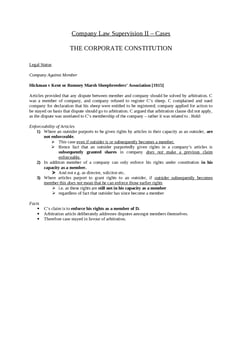Rayfield v Hands [1960] Ch 1
Judgement for the case Rayfield v Hands
Table Of Contents
KEY POINTS
A provision in the articles of association of a company specified that every member intending to transfer shares must inform the directors. The directors "will take the said shares equally between them," and they "will pay a fair value therefore."
A key point of contention revolved around interpreting the term "will" within this provision. Based on this provision, can the directors be held liable to acquire a member's shares?
The relevance of the Construction Companies Act, 1948 (11 & 12 Geo. 6, c. 38), specifically section 20(1) in this context is tested. If the contractual relationship with multiple parties pertains to a third party's enforcement of this contract. The company's articles of association govern the contract enforcement among the members themselves. In terms of contract construction, the principle of "Ut res magis valeat quam pereat" is invoked.
This principle underscores the importance of interpreting the company's articles of association to uphold their value and purpose.
FACTS
The plaintiff held shares in a company governed by its articles of association. Article 11 of these articles mandated shareholders to notify the directors if they intended to transfer shares within the company.
The article stated that the directors "will take the said shares equally between them at a fair value." In compliance with Article 11, the plaintiff duly informed the directors of his intent to transfer shares.
A dispute arose as the directors argued they were not obliged to acquire and remunerate the plaintiff for his shares. They contended that the articles did not impose such a liability on them.
The plaintiff filed a lawsuit seeking a determination of the fair value of his shares and an order requiring the directors to purchase these shares at a fair value.
JUDGEMENT
When properly interpreted, the articles mandated the directors to acquire the plaintiff's shares at a fair price.
Article 11 primarily pertained to the association between the plaintiff in his capacity as a member and the defendants, who were members of the company rather than in their roles as directors.
It was not a prerequisite for the plaintiff to include the company as a party in addition to the directors to succeed in his legal action.
COMMENTARY
Article 11 mandated shareholders of a company to notify directors of share transfers, with directors obliged to acquire these shares at a fair value. A dispute arose when directors claimed no such obligation existed.
The court confirmed that the articles did require the directors to buy the shares at a fair price.
It clarified that Article 11 pertained to the shareholder's relationship with their fellow members, not their roles as directors. Importantly, involving the company as a party alongside the directors was deemed unnecessary for the legal action's success.
ORIGINAL ANALYSIS
Articles provided that where a member wished to dispose of shares, in certain circumstances directors had an obligation to purchase those shares offered.
Claimant wished to sell his shares and a director, who was also a member, refused to take them.
Held
-
Company’s articles intended for the directors to be bound as members in this situation.
i.e. as matter related to purchase of shares.
Therefore directors were bound by articles in their capacity as members.
For Further Study on Rayfield v Hands
Need instant answers? Our AI exam tutor is here to help.
Ask questions 🙋 Get answers 📔 It's simple 👁️👄👁️
Our AI is educated by the highest scoring students across all subjects and schools. Join hundreds of your peers today.
Get StartedSimilar Cases
Related Product Samples
These product samples contain the same concepts we cover in this case.

